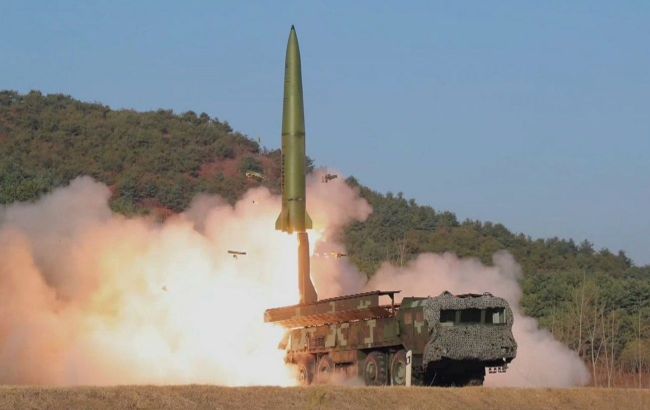Why Russia starts striking Ukraine with DPRK missiles more often: Expert opinion
 Photo: Russian forces are increasing their use of North Korean KN-23 missiles against Ukraine (Source: Open sources)
Photo: Russian forces are increasing their use of North Korean KN-23 missiles against Ukraine (Source: Open sources)
Russia has increasingly used North Korean missiles during air attacks on Ukraine. The KN-23 ballistic missiles are essentially an inferior-quality analog to Russia's Iskander-M.
Why has the aggressor started using North Korean missiles more frequently, and could this impact the front line? Military expert and reserve major of the Ukrainian Armed Forces, Oleksii Hetman, explains in a comment to RBC-Ukraine.
Official reports of Russia using North Korean KN-23 ballistic missiles against Ukraine first emerged in early January this year. After the initial incidents, there was a nearly five-month hiatus.
Defense Express noted that the first incident involving these missiles occurred on July 31 after the pause. At that time, a KN-23 missile failed to reach its target. The next instance of these missiles being used was on August 6, when one of the North Korean missiles that fell near Brovary exploded in mid-air. The most recent KN-23 launch was directed at Bohodukhiv in Kharkiv region, which happened last night.
Experts speculate that the adversary may have used the pause to work on improving the KN-23. Military expert Oleksii Hetman shares this view.
"The first North Korean missiles used against us didn’t even reach their target. They were technically very poor. There was indeed a pause, most likely because they were refining these missiles and addressing the deficiencies discovered during combat testing on our territory. Now, they are trying again to see if these missiles can achieve their objectives," Hetman told RBC-Ukraine.
He notes that it is not accurate to say that Russia is using KN-23 missiles because it lacks its own armament. Here’s why.
"Firstly, regarding ballistic and cruise missiles of all types, Russia produces up to 100 units per month. Additionally, they still have a certain reserve of missiles from the beginning of the full-scale war. This reserve amounts to no more than 15% of what they originally had. Therefore, it is considered an untouchable reserve, and they are unlikely to deplete it," explains Hetman.
He adds that the number of Russian missiles converted into semi-ballistic ones from S-300/400 SAM systems is estimated to be between 3,000 and 5,000 units.
"So this is a large quantity. It is not necessary to say that they need North Korean missiles to make a significant change. More likely, it is an agreement between North Korean leader Kim Jong-un and Russian dictator Vladimir Putin to test these missiles in combat conditions to determine what needs improvement," Hetman speculates.
The expert notes that there are various estimates of how many such missiles Pyongyang might supply to the Russians. He does not exclude the possibility that it is certainly not in the tens. It could be hundreds (from 100 to 500-600 units), but not more than a thousand, according to the interviewee. He also agrees that the KN-23 is a kind of analog to the Russian Iskander-M missile but of lower quality.
"The Iskander-M has decent technical characteristics, and we are able to intercept them. If the KN-23 missile is worse in its performance, it will be easier for us to shoot them down. However, any additional missiles for the Russians will be advantageous for them. It is better than nothing. But it should not be expected to make a significant difference on the front line," Hetman concluded.
North Korea is supplying Russia with missiles and artillery ammunition
Back in January, the US and its allies issued a joint statement against the supply of weapons between North Korea and Russia, particularly condemning Moscow’s purchase of North Korean ballistic missiles and their use against Ukraine.
Currently, it is not precisely known how many missiles and launchers Russia has received or who is servicing them—whether North Korean or Russian personnel.
In addition to ballistic missiles, Pyongyang is also supplying Moscow with artillery shells. South Korea believes that the Russians might have received at least five million ammunition rounds from North Korea in exchange for technology for space satellites and conventional weapons.
It should be noted that the UN Security Council has imposed an embargo on North Korea, prohibiting UN member states (including Russia) from buying or selling weapons and military equipment to North Korea.

